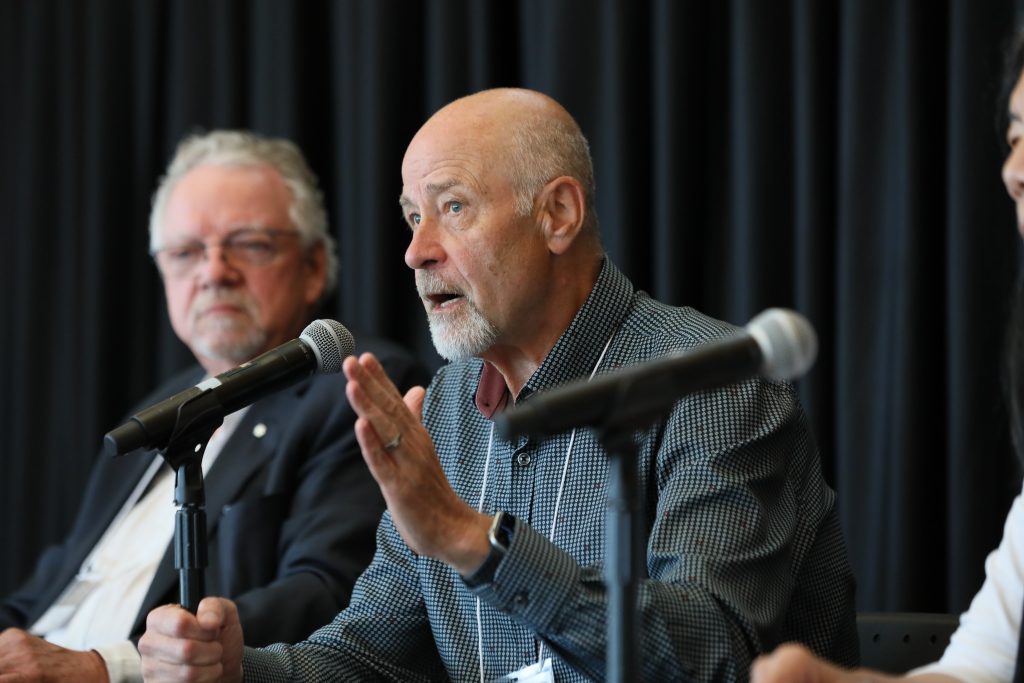Health policy experts dispel unhelpful myths of the Canada Health Act
Accomplished health policy experts Bill Tholl and Greg Marchildon debunked some myths about the Canada Health Act and shared their arguments for a Canada Health Act 2.0, spurring questions from an audience of researchers about what that could like in the current political moment. The ideas were shared at the Canada Health Act at 40 Research Roundtable on June 20 at the University of Ottawa. The conversation, moderated by Elizabeth Kwan from the Canadian Labour Congress, is now available for viewing here –
Bill Tholl was a key drafter of the Canada Health Act under Health Minister Monique Bégin. He called Bégin, who died in 2023, the mother of Medicare, noting she would say she was just doing her job when praised. Tholl also worked with Justice Emmett Hall who came out of retirement to study extra billing and user fees in health care. Tholl also recalled father of Medicare, Tommy Douglas, at the 1979 SOS Medicare conference that gave birth to the Canadian Health Coalition.

Tholl referenced his article with Greg Marchildon, published this month by Policy Options, called ‘Canada Health Act at 40: Spring Forward or Fall Back?‘ The article revisits ten myths about the Canada Health Act first described in a 2017 article.
Tholl focused on only three of the ten myths at the research roundtable. First, he said there is a false notion that the Canada Health Act is responsible for the current access and waiting time problems. “As you have heard, it’s the provinces and the territories that have the primary responsibility for the administration and delivery and governance of health care,” said Tholl while noting primary care reforms are essential.
The second myth is that the Canada Health Act has frozen out innovation. According to Tholl, “what the Canada Health Act does is provide a floor, not a ceiling. It doesn’t limit what provinces can do and you heard today that many provinces go well beyond the ambit of the Act but is it time to raise that floor, given the 40 years of experience with innovation and everything else. We contend it is.”
Tholl said a third myth is that the Canada Health Act cannot be amended without opening up a Pandora’s Box to privatization. “In 1984, there were the same concerns about passing the Canada Health Act… What it took was political leadership from a Minister for Health and a willing Prime Minister… what it takes is political will. There are precedents,” argued Tholl.
Greg Marchildon was the executive director and lead drafter of the Commission on the Future of Health Care in Canada, known as the Romanov commission.
Marchildon said there is a “window of opportunity” but “time is ticking right now, and there are two fronts that we need to move on immediately one of them is the provincial front.”
To address the dissatisfaction with the state of health care, Marchildon said “we need to put pressure on provinces and territories as citizens and as members of civil society groups to address the access quality and timeliness of care problems.”

Marchildon said the second front involves the government of Canada. He called on the audience to lobby the Liberal government and the NDP which supports key bills to draft, introduce and pass into law the Canada Health Act 2.0. “We’re talking about updating, clarifying, strengthening the Act,” said Marchildon.
“We need to strengthen portability in Canada and really keep with the spirit of the original Canada Health Act to ensure that everyone in the country, wherever they’re traveling in the country, that they have access without financial barriers to health care and that portability is defined in that way. Portability is after all the glue that holds this pan-Canadian health system together.”
Marchildon also wants the definition of insured health services to include all primary care providers including nurse practitioners to address the problem in Ontario and other jurisdictions. “Connected to this is virtual care. This may require some definition of what’s meant by medically required and medically necessary to make sure it includes of course virtual care services whether primary care or specialist type services,” added Marchildon.
Giving investigative powers to the team responsible for the enforcement of the Canada Health Act through “perhaps an arms-length agency” is a third recommendation from Marchildon.
“The Canada Health Act 2.0 is an on-ramp for dental care and pharmacare for these to become universal services. This will force both the Liberals and the NDP to reveal their timelines to turn what are now targeted services and very partial services into universal services,” said Marchildon.
The discussion period focused on the ongoing debate of opening up the Canada Health Act versus creating sister legislation, and the political reality of what’s possible in this moment.

Tholl shared that “The Canada Health Act in its original version was written literally on a napkin at the Whispers restaurant.” He said the Canadian Federation of Nurses Union, the Canadian Nurses Association and the Consumers Association of Canada were among those behind the Act while the Canadian Medical Association and every province, except the Manitoba NDP government, was against it.
This is the fourth of a series of eight weekly blogs summarizing what was heard at the Canada Health Act at 40 Research Roundtable at the University of Ottawa on June 20, 2024. The research roundtable was organized by the Canadian Health Coalition and the University of Ottawa’s Centre for Health Law, Policy and Ethics with support from St. Thomas University.
Next week’s blog will discuss the panel on expanding Medicare with David MacDonald from the Canadian Centre for Policy Alternatives, Sarah Kennell from the Canadian Mental Health Association and Suzanne Dupuis-Blanchard from Université de Moncton and the Nursing Home Without Walls program. Previous webinars can be watched on the Canadian Health Coalition’s Youtube channel.



